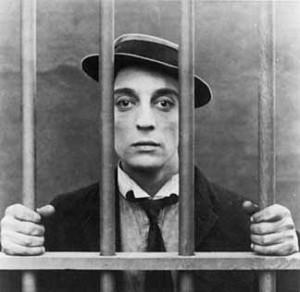
I’ve been silent awhile, mostly because I’ve had nothing of substance to say—a state I get into fairly frequently, truth be told. Prisoners in old movies would knot bed sheets together while painstakingly working the bars on their windows loose; in slightly less aged movies, prisoners work bricks free from a wall and spend years digging their way to freedom with a spoon. Me: I read books. Books and magazines and blogs. Eventually there’s a flash of hope: the bars come loose in my hands, or a streak of dusty light appears at the end of the tunnel. I start writing poems again, and my little world of imagined freedom is saved from oblivion like a capsized boat righted by some Ray Harryhausen version of Poseidon. I mean there’s “a rebirth of wonder,” as Ferlinghetti puts it.

I’m not there yet. Not today. But I did follow a link from Andrew Shields’ blog to this post by Donald Brown, a poet and film critic teaching at Yale, which has me thinking in a new way. Here’s an excerpt:
In my own case, ‘thinking like a lyric poet,’ when it happens, bypasses ‘thinking like a literary critic,’ which is to say that those lyric poets who ‘score’ most with me make me forget my own taste, my own intentions for language, my own limited grasp of myself. They remake my relation to language; they add to what I can imagine words doing. And when this doesn’t happen, then all I can see is how someone has wilfully distorted the perfectly suitable relation I had to language and to lyricism and to beauty and to all those other things I assume to be the aesthetic occasion of the lyric poem, or, worse, how someone has tried to approximate something I’ve already experienced, processed, understood, and has not done it well enough for me to recognize it, or has done it so poorly or erratically that I don’t want to recognize it.
This reminded me of something I’ve always looked for in my own poetic practice: a way to “forget my own taste … [and] intentions for language.” Maybe I occasionally get sentenced to my wonderless prison because I forget how to forget my own taste and intentions. Maybe they are the walls and the bars, and in some ways my handling of this blog has only reinforced them.
I wonder…

 Joseph Hutchison, Colorado Poet Laureate 2014-2019, has published 20 collections of poems and edited or co-edited three poetry anthologies. He currently directs two master’s-level programs for University College at the University of Denver: Professional Creative Writing and Arts & Culture Management. Joe lives with his wife, Melody Madonna, in the mountains southwest of Denver, Colorado, the city where he was born.
Joseph Hutchison, Colorado Poet Laureate 2014-2019, has published 20 collections of poems and edited or co-edited three poetry anthologies. He currently directs two master’s-level programs for University College at the University of Denver: Professional Creative Writing and Arts & Culture Management. Joe lives with his wife, Melody Madonna, in the mountains southwest of Denver, Colorado, the city where he was born. 










Thanks. Sometimes I'm not too swift.<br />Astris is the code for this comment. One of the daughters of Helios. She and her sisters mourned so long for Phaeton the egomaniacal ninny that the gods turned them into poplars and their tears into amber. The connection eludes me just now, but I'm sure there is one, outside my own limited grasp of myself.
The relevant link is the phrase "this post" in my paragraph, but here's the direct one: http://browndmt.blogspot.com/2009/08/lyric-occasions.html<br /><br />You'll love Calvino. <i>If on a Winter's Night a Traveller</i> is a delight.
Thanks for the link to Donald Brown. The role of the reader seems to be in the air these days. Oddly, I couldn't find the bit you quoted anywhere. But I did pause to order "If on a Winter's Night a Traveller" which I haven't read. Wherever the quotation was from it was interesting, and tied in with the blog Matthew Shmeer sent us to last week, with it's comment that
A big "YES" to William's window-light and Vassilis's reminder about the nature of spirit. Before it's in poetry, it's the world and in the heart. Thanks, my friends!
You've stated most eloquently what many of us think daily but who lack either the wisdom and/or the courage to admit, trapped as we are in our own self-made prisons. But, will you just look at what William has the spirit to say!
Joe, there’s a lot of wisdom here, both in your thoughts and in the quote you choose. It’s true that we feel safe in our self-made prisons, and often confuse freedom with a mere change in decor. But, by golly, will you just look at that light coming in through the window, and the beauty of those lines on the floor!